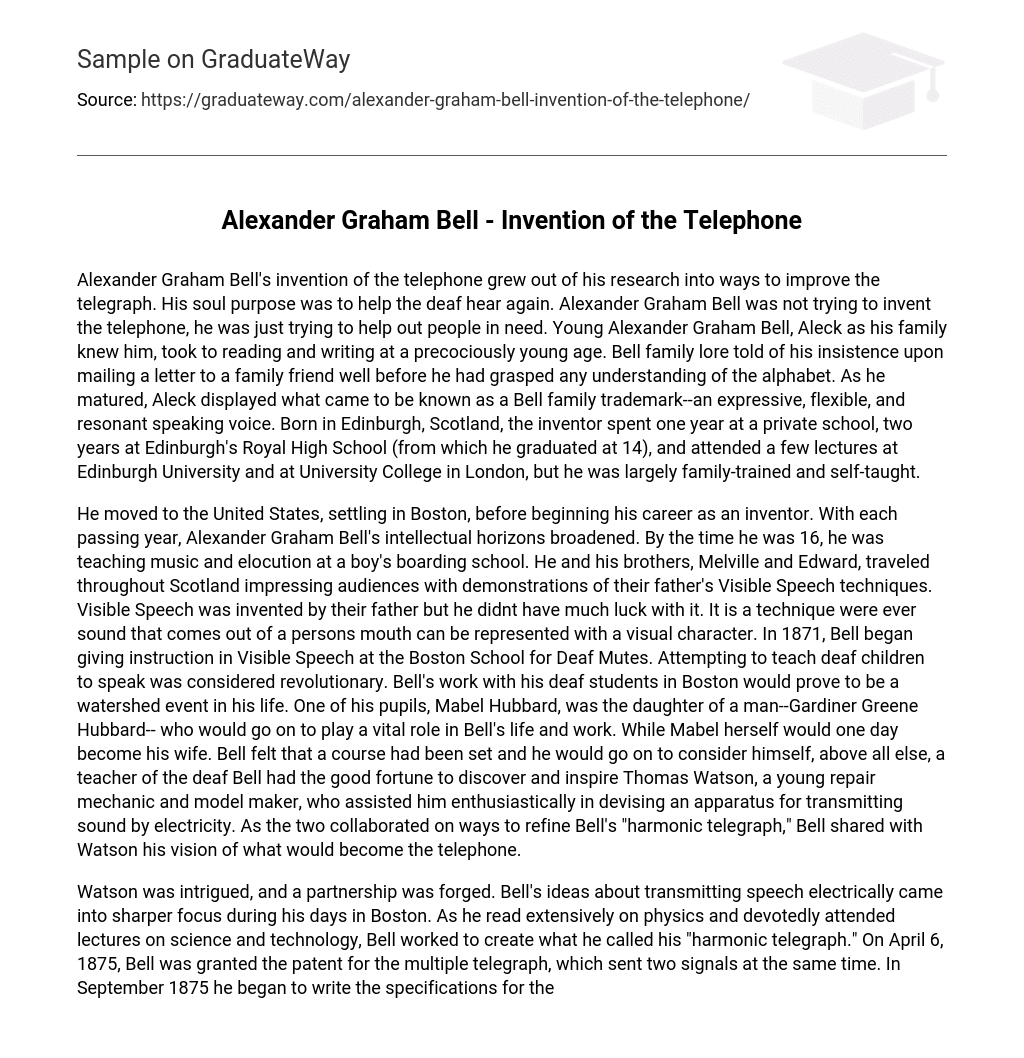The invention of the telephone by Alexander Graham Bell was a result of his research on improving the telegraph. His focus was on assisting individuals with hearing disabilities, rather than specifically aiming to create the telephone. From a young age, Bell demonstrated exceptional reading and writing abilities and was known as Aleck within his family. Anecdotes passed down through generations reveal that even before fully understanding the alphabet, he insisted on sending letters. As he grew older, Aleck displayed a unique characteristic shared by the Bell family: an expressive, adaptable, and resonant speaking voice. Born in Edinburgh, Scotland, Alexander Graham Bell attended private school for one year followed by two years at Edinburgh’s Royal High School; he graduated at just 14 years old. While attending some lectures at Edinburgh University and University College London, his education primarily involved learning from his family and self-teaching.
After relocating to the United States and settling in Boston, Alexander Graham Bell embarked on his career as an inventor. At the age of 16, he taught music and elocution at a boarding school to expand his knowledge. Together with his brothers Melville and Edward, they traveled around Scotland showcasing their father’s invention known as Visible Speech. This method, devised by their father, aimed to visually represent all sounds made by individuals.
In 1871, Bell brought about a revolution in education by introducing Visible Speech at the Boston School for Deaf Mutes. This period had a profound impact on Bell’s life as it was here that he encountered Mabel Hubbard, one of his students who eventually became his wife.
Bell primarily saw himself as a teacher for the hearing-impaired. Fortunately, he crossed paths with Thomas Watson—an aspiring repair mechanic and model maker who played a vital role in developing a device for transmitting sound through electricity. While collaborating on enhancing Bell’s “harmonic telegraph,” Bell shared his vision for the future of telephony with Watson.
Watson’s interest was sparked, leading to a partnership between Watson and Bell. While in Boston, Bell became more focused on his ideas about transmitting speech electrically. Immersed in physics literature and attending scientific lectures, Bell worked on inventing the “harmonic telegraph.” Eventually, on April 6, 1875, Bell received a patent for the multiple telegraph that could send two signals simultaneously. In September 1875, he began writing specifications for the telephone after successfully developing the harmonic telegraph which allowed for multiple messages over one wire. On March 7, 1876, the U.S. Patent Office granted him Patent Number 174,465 for transmitting sounds through electrical undulations resembling air vibrations.
Following Bell’s groundbreaking invention of the telephone emerged numerous patent lawsuits and corporate tactics. Western Union Telegraph Company refused to remain idle as they dominated telegraphy while the Bell Telephone Company gained attention. Determined to develop their own telephone technology, Western Union sought help from renowned inventors Thomas A. Edison and Elisha Gray.
The Bell Company took legal action against Western Union to protect its patent rights and ultimately emerged victorious. Over time, the Bell Company evolved into AT&T but had to continuously defend its patents against over 600 legal disputes.
In every case, thanks largely to Alexander Graham Bell’s clear and convincing testimony, the patent withstood attack. Bell, who invented the telephone, also conducted experiments in communication and ultimately invented the photophone, a predecessor to modern optical fiber systems, which transmitted sound using light beams. Additionally, Bell contributed to medical research and developed methods for teaching speech to the deaf. Bell had a wide range of inventive accomplishments, with 18 patents granted solely in his name and 12 patents shared with his collaborators. These patents covered areas such as telephones, telegraphs, photophones, phonographs, aerial vehicles, hydroairplanes, and selenium cells. Bell was also enthusiastic about promoting a love for science and the natural world and provided financial and editorial support to both Science magazine and National Geographic. When Bell passed away on August 2, 1922, a minute of silence was observed nationwide as a tribute to the man whose urge to communicate made telephones possible.
Aleck, on top of his various talents, achieved several notable accomplishments in his life: the invention of the telephone, his contributions to enabling deaf individuals to speak, and his successful marriage. Whenever you use the phone, take a moment to acknowledge the immense impact of Alexander Graham Bell, the man responsible for making it all possible.





